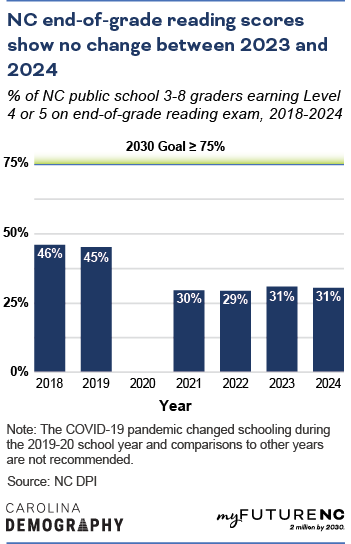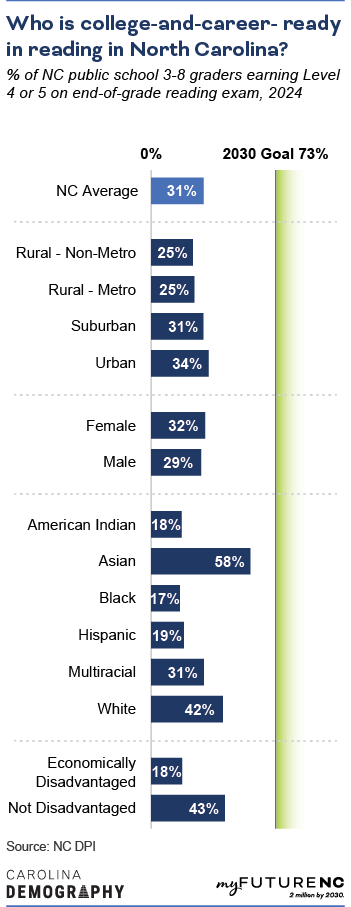Percentage of North Carolina students in grades 3-8 earning a college-and-career-ready score (4 or 5) on the end-of-grade reading exam
Last updated: 2024
= Top southern state :
only available for totals, not available for all indicators
What does College-and-Career-Ready in Reading mean?
Percent of North Carolina students in grades 3-8 who earned a college-and-career-ready score on the End-of-Grade Reading exam.
What does this data show?
Thirty-one percent of North Carolina 3rd through 8th graders earned college-and-career-ready scores on the Reading End-of-Grade exam in 2024. The North Carolina End-of-Grade tests are designed to measure student performance on the goals, objectives, and competencies established as grade-level standards.
By 2030, the goal is to have 73% of students in grades 3-8 earn college-and-career-ready scores in reading. This goal is aligned with the North Carolina Department of Public Instruction Every Student Succeeds Consolidated State Plan.
Why does College-and-Career-Ready in Reading matter?
Students who are reading on grade level by 3rd grade are more likely to finish high school. Students who are not reading on grade level by mid-elementary school are less able to keep up with their peers, are more likely to fall behind on future assessments and continue to be poor readers in high school, have more behavior and social problems in subsequent grades, and are more likely to drop out of high school.
This pattern continues until students finish middle school. Eighth grade test scores are also strong predictors of success on the ACT and future college enrollment.
How is North Carolina performing?
Meeting the 2030 Goal
North Carolina needs 293,891 more students to earn a college-and-career-ready score to meet the statewide goal of 73% college-and-career-ready in reading.

In 2024, 31% of North Carolina students in grades 3-8 earned college-and-career-ready scores on the reading end-of-grade exam.
Trends
In 2018 and 2019, the percent of students earning career-and-college ready scores in reading was around 45%. In 2022, the percent was 29%, the lowest since 2018. In 2024, the percent of students earnings career-and-college ready scores in reading increased slightly to 31% with no change between 2023 and 2024.
By geography
Students from urban counties were most likely to earn college-and-career-ready scores in reading (34%), followed by students from suburban counties (31%). Among students from rural counties, students in rural counties in a metropolitan area were more likely to earn college-and-career-ready scores in reading (26%) than students in rural counties outside of metro areas (25%).
By sex

Female students were more likely to earn college-and-career-ready scores in reading than male students: 32% vs. 29%.
By race/ethnicity
Asian students were the most likely to be college-and-career-ready in reading (58%), followed by White students (42%) and then multiracial students (31%). A smaller percentage of Hispanic (19%), American Indian (18%), and Black (17%) students earned college-and-career-ready scores in reading in 2024.
By economic disadvantage
Economically disadvantaged students—meaning students receiving free or reduced price lunch—were half as likely as their peers who are not economically disadvantaged to earn college-and-career-ready scores in reading: 18% of economically disadvantaged students earned college-and-career-ready scores compared to 43% of non-economically disadvantaged students.
Methodology
Where does the data for College-and-Career-Ready in Reading come from?
Data for student performance in the 2023-24 school year is reported by the North Carolina Department of Public Instruction (NC DPI). Students are classified as “college-and-career-ready” if they score at a Level 4 or higher on the End-of-Grade Reading exam.
How was the data calculated?
This is a direct download from NC DPI (2023-24 School Assessment and Other Indicator Data (XLSX)).
Who is included?
All North Carolina public school students in grades 3-8.
Who is excluded?
Some groups of students are excluded from the proficiency calculations:
- students with an NC DPI approved medical exemption.
- students in their first or second year in a U.S. school.
For complete details on inclusions and exclusions, see the NC DPI Business Rules.
Learn more
Who is working on this in NC?
Help improve this section
If you know of an organization that is working on this topic in NC, please let us know on the feedback form.
Name: North Carolina Early Childhood Foundation
Scope: Statewide
Website: https://buildthefoundation.org/initiative/campaign-for-grade-level-reading/
About: Since 2015, the North Carolina Early Childhood Foundation has led the national Campaign for Grade-Level Reading in North Carolina. The Campaign is mobilizing communities to ensure that more children from low-income families succeed in school and graduate prepared for college, a career and active citizenship. It is a collaborative effort by foundations, nonprofit partners, business leaders, and government agencies. Across the country there are more than 360 communities, including 3,900 local organizations and 450+ state and local funders who have joined the effort.
Name: Wolfpack WORKS
Scope: Statewide
Website: https://ced.ncsu.edu/news/wolfpack-works-a-look-at-the-literacy-initiatives-first-year/
About: Started in Summer 2018, Wolfpack WORKS (Ways to Optimize Reading/ Writing for Kids Statewide) supports beginning K-2 teachers in 16 high-need school districts across North Carolina as they learn to implement evidence- based literacy instruction in their classrooms for all children.
NC-focused, state-level dashboards
Name: NC Early Childhood Action Plan Data Dashboards
About: To track progress toward the targets and sub-targets of the 2025 goals in the North Carolina Early Childhood Action Plan, each of the 10 goals of the plan has its own page of data and information. The dashboards are intended to promote collective insight and awareness around the data outlined in the plan. All data will be reevaluated and updated on a regular basis.
Name: NC School Report Cards
Website: https://www.dpi.nc.gov/data-reports/school-report-cards
About: North Carolina’s school report cards are an important resource for parents, educators, state leaders, researchers, and others, providing information about school- and district-level data in a number of areas. These include student performance and academic growth, school and student characteristics, and many other details.
Further research and literature
Hernandez, D. J. (2012). Double Jeopardy: How Third-Grade Reading Skills and Poverty Influence High School Graduation. Baltimore, MD: The Annie E. Casey Foundation.
Lauen, D. L., & Tomberlin, T. R. (2018). North Carolina K-12 Achievement. Raleigh, NC: myFutureNC.
The Annie E. Casey Foundation. (2010). Early Warning! Why Reading by the End of Third Grade Matters. Baltimore, MD: The Annie E. Casey Foundation.
The Children’s Reading Foundation. (n.d.). Third Grade Reading Success Matters. Retrieved December 9, 2019, from https://www.readingfoundation.org/third-grade-reading-matters.
FAQ
What test levels correspond to college-and-career-ready scores?
Students are classified as college-and-career-ready if they score at Level 4 or Level 5 on the end-of-grade exam. Both scores are considered on track for college and career:
- Level 4 demonstrates a thorough understanding of grade level content standards.
- Level 5 demonstrates a comprehensive understanding of grade level content standards and indicates that the student is prepared for advanced content in their next grade or course.
Is college-and-career-ready the same as grade-level-proficient?
No. College-and-career-ready is a more rigorous standard than grade level proficient. Students who score at a Level 3 on end-of-grade exams are considered grade level proficient. Level 3 demonstrates a sufficient understanding of grade level content standards, but these students may need some support to succeed with content in their next grade or course.
Are North Carolina’s end-of-grade exams the same as NAEP?
No. NAEP data is not comparable to end-of-grade data. The National Assessment of Educational Progress is “a national assessment of students at different ages and in different subjects. Data is reported every two years, and North Carolina looks at the NAEP fourth grade reading assessment scores to determine how NC students are doing in reading proficiency over time and compared to the national average. Since the NAEP is a sample of fourth graders, rather than assessing every fourth-grader in the state, NAEP data is not available at the school district or county level.”



